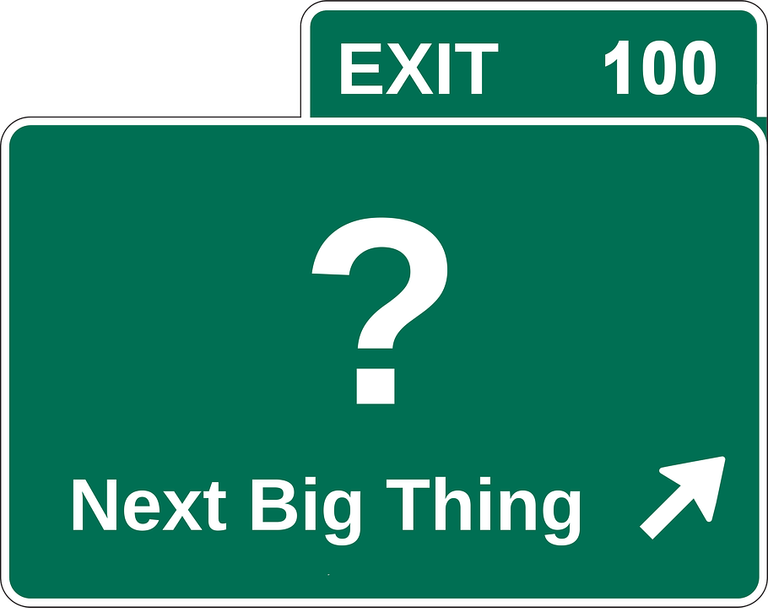How do you respond to invitations? When life beckons you to change, do you shut your eyes and wait for it to pass, or do you take action?
True - it starts with an idea.

here, and I've described some of the recent decisions I've made here, but I'll illustrate more in depth my responses to inviting stimuli.In the comments on my last post, @arthur.grafo asked me what I was doing to push the envelope. After all, I was talking about creating my own life, but I was being vague about it. I've talked a bit about my creative pursuits
First of all, I have to give credit where it's due. I would recommend the following resources to anybody who wants to better themselves.
James Altucher, who wrote "Choose Yourself" and delineates a path to success through your own effort and ideas. After reading his book, I really tossed the idea of "formal education" out the window.
Charles Hugh Smith, who wrote "Get a Job, Build a Real Career, and Defy a Bewildering Economy". I had a brief discussion with him about putting bitterness aside and becoming everything you can become.
Jordan Peterson, who is the one who really motivated me to get off my ass. He's spoken a lot about creating meaning in life through hard work and dedication.
So how did these three people change my life? It wasn't just them; it was my decision to act in response to them.
finally end up studying for my Security+ certification (which I am actively pursuing). I also stopped caring about my credit score, stopped being afraid of my creditors, and decided to pay myself first. Altucher's work firmly cemented my will to work for myself.After I read "Choose Yourself" (which was recommended by my friend @Zoidsoft), I totally abandoned the idea of getting a bachelor's degree. Instead, I started focusing on what I could do to establish multiple streams of income, and began an admittedly half-assed self teaching schedule. I wandered through Java, then HTML, then Cisco, to
I saw Charles Smith's blog and decided to write him an email. The most valuable lesson I took from his response was the importance of your network. People are important if you want your life to get anywhere. For many of us bitter 20-somethings, people seem to be a plague upon the planet; but upon closer inspection, our resentment is not justified, because we often do little to add value to the world. Which brings me to...
Jordan Peterson. This guy rocked my world because he dropped the importance of personal responsibility on my head . Again, much of the bitterness experienced by young (or old) people is their deferment of responsibility to someone else; they can blame the outside world for their own shortcomings, and they don't have to do the difficult work that brings achievement. This is when I put my fear aside and decided to come work a construction gig so I could make enough money to free myself (from car loans, credit cards, rent, etc.)
- In response to Altucher, I dropped out of school and gave up a futile search for institutionalized meaning.
In response to Smith, I began to value my relationships (especially working relationships) much more.
In response to Peterson, I chose to do the thing I was afraid of.
But all of these demanded action.

But the actions I have taken have changed my life. Ultimately, the plan is to create a live music experience that challenges and jars people, while also posting my thoughts and travels on Steemit, while also building a cob house after acquiring some land out west. I'll have to deal with the system to get by (for now), but I am challenging myself to use all of my downtime to achieve my goals.
You can do the same. Listen, but also respond. This alchemical experience will propel you where you need go. I've still got plenty of work to do on myself - I'm no guru - but as Peterson says, "We don't know what the upper limits to [our achievements] are."
The irony is that those with a good credit score are penalized for having a good score. This is because having a good score makes you a target and you have to pay more to protect that score. If you went bankrupt, then the score drops, but at the same time you're no good any more to identity thieves as they can't use your data to apply for credit in your name.
The old business model of centralized IT is nearly done for. People just have to become aware of what's available in other blockchains and jump ship into the decentralized web.
I felt relieved when I stopped giving a damn about credit, and started caring more about my relationships.
And I think about centralization every time I learn about some cybersecurity issue. I'm studying for Security+, but most issues I come across are only as detrimental as the honeypot is large! I look forward to jumping to the blockchain next. Any advice on courses/books?
I'm in Ivan Liljeqcvist's Blockchain Coding Academy. They cover programming in HTML, Javascript, C++, NEM, EOS, ETH.
I'll add that to my to-do list. His course looks to go much deeper than the others I've seen.